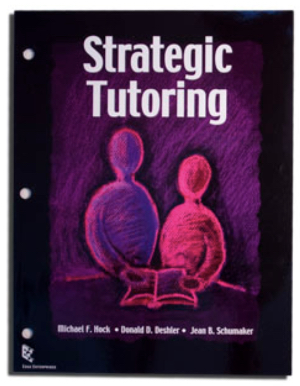Strategic Tutoring

With Strategic Tutoring, a tutor not only helps a student complete and understand an immediate assignment but also teaches the student strategies required to complete similar tasks independently in the future. The primary focus is on teaching skills and strategies that support learner independence.
Research results showed that students in strategic tutoring improved their achievement test scores in reading comprehension, written expression, and basic math skills. On average, their grade-level achievement scores increased by 10 months during a four-month instructional period. In contrast, students in a comparison group without the strategic tutoring instruction experienced a mean gain of only 3.5 months during the same period.
Author(s):Michael F. Hock, Donald D. Deshler, and Jean B. Schumaker
Publication Info: Edge Enterprises, 2000
Resources:
- Strategic Tutoring Research (pdf)
- The Beginner-Level Professional Development CD Program For Strategic Tutoring Research (pdf)
- The Advanced-Level Professional Development CD Program For Strategic Tutoring (pdf)
Research Articles:
- Hock, M.F., Pulvers, K.A., Deshler, D.D., & Schumaker, J.B. (2001). The effects of an after-school tutoring program on the academic performance of at-risk students and students with LD. Remedial and Special Education, 22(3), 172-186. This article describes two studies in which researchers found that at-risk students and students who have learning disabilities could earn average or better grades if they had the support of trained adult tutors.
- Hock, M.F., Schumaker, J.B., & Deshler, D.D. (2001). The case for strategic tutoring. Educational Leadership, 58(7), 50-52. This article makes the case for strategic tutoring as an effective model for teaching students how to learn while helping them with class assignments.
- Hock, M.F., Schumaker, J.B., & Deshler, D.D. (1995). Training strategic tutors to enhance learner independence. Journal of Developmental Education, 19(1), 18-26. This study evaluated the effects of training traditional academic tutors hired to work with underprepared university-level student athletes to implement a strategic approach to tutoring.
The Story Behind Strategic Tutoring from author Mike Hock:
While I was directing the academic support program for student athletes at the University of Kansas, I noticed that the tutors we hired had very few skills with regard to teaching the students. Although they were experts in their subject-areas, they really did not know how to teach the students to be independent learners. In fact, as I was gathering observation data on them, I noticed that they often did a large portion of the students’ work themselves. I decided to develop a method for tutoring students whereby they could not only complete their assignments and study for tests, but that they would also learn how to be independent learners who could complete their assignments and study for tests on their own in the future. I worked with Don and Jean to develop and refine this method and also conduct my dissertation research. The model we eventually developed was called Strategic Tutoring. It was based upon the knowledge that had been acquired through research at the Center for Research on Learning on learning strategies. Thus, we were able to take proven methods for strategic instruction and develop a new instructional technology that was responsive to the immediate academic needs of the students and yet still prepared them to be independent learners.
Author's Thoughts about Strategic Tutoring:
We found that Strategic Tutoring is a very effective way of teaching students how to become independent learners. Not only do students complete more assignments and earn better grades on tests when they participate in Strategic Tutoring sessions, they also learn how to independently succeed after Strategic Tutoring has been discontinued. Since our original research was completed, Strategic Tutoring has been successfully used in a variety of settings. It has been used in elementary through high school settings in before- and after-school settings as well as college and university settings. It has also been used with youths in the Casey Family Foster Care Programs in Seattle, Rapid City, Tucson, and Oklahoma City. There is one caveat associated with Strategic Tutoring, though: Strategic Tutoring is most successful when it is used one-on-one or with very small groups of students.
Tutors and Student Feedback on Strategic Tutoring:
Tutors and students rate Strategic Tutoring highly. Although students might initially express frustration that they “just want to get their assignment done,” they learn to appreciate the fact that they are becoming better and better at completing their work independently. They gain confidence in themselves as learners, and they feel good about the success they achieve. Tutors also report that they are pleased with the success that their assigned students are having.
This product is available through Edge Enterprises, Inc.
Please note that professional development, coaching, and infrastructure support are essential components to effective implementation of SIM instructional tools and interventions. It is highly recommended that you work with a SIM professional developer. See the SIM Event list for sessions or email simpd@ku.edu to learn more.
An accessible version of the documents on this site will be made available upon request. Please contact the KU CRL Professional Development Research Institute, at simpd@ku.edu to request the document be made available in an accessible format.